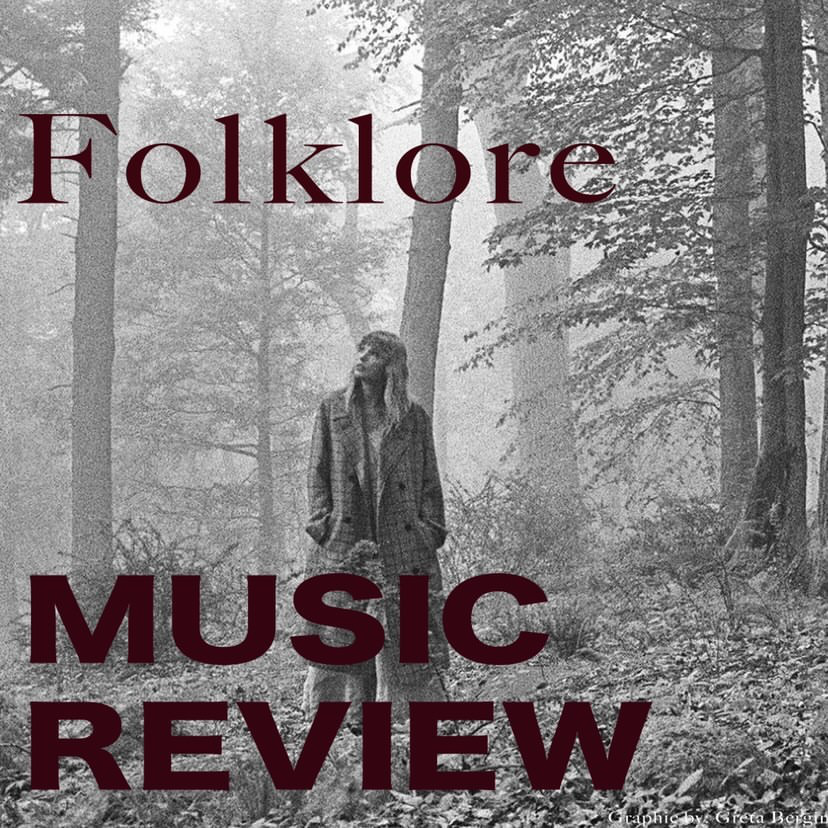Taylor Swift’s Folklore And Its Stunning Storytelling
November 12, 2020
Last July, during a quiet period for the music industry due to lack of production resources in the pandemic, Taylor Swift released folklore, a 16 track indie/folk album with hypnotic melodies and whimsical narratives intended to string together an underlying theme and story that fans were left to decipher. Swift wrote, recorded, and prepared to release this album in just four months while she was in quarantine. After two months of contemplation, I’ve finally untangled the themes of this album and found the right words to describe it in a review.
folklore brings listeners into a rustic, earthy setting with its mellow acoustics and vocal stylings, creating an atmospheric soundtrack for the approaching autumn months. “the 1” opens the album by evoking a coffee shop sort-of feeling with jazzy notes and warmth to its tone. With lyrics such as “if my wishes came true / it would’ve been you,” folklore is introduced on a nostalgic, contemplative note that listeners can all empathize with, looking back on that one person from our past we all think it could’ve worked out with. The album’s lead single, “cardigan,” has a moody, candlelit sound that, on the first few listens, is so sweeping that the power of the lyrics goes unnoticed. Once you’re able to fully take in the raw poetics of the song, it becomes clear that lyrically, this is one of Swift’s best creations. “cardigan” narrates the stages of feeling used, forgotten, and discarded by a romantic partner who later swoops back in and starts the cycle all over again by describing herself as an “old cardigan left under someone’s bed.” Ironically enough, the central metaphor of the song is where the lyrics are lackluster. Lines that are rushed through and overall unnoticed due to the pace of the song are the ones that are most impactful – describing the romantic interest as “leaving like a father/running like water” from her.“I knew you’d haunt all of my ‘what-if’s’” points back to the contemplative theme of “the 1,” where Swift contemplates what could have been if just one thing had been different.
folklore also features a song titled “epiphany” that compares and contrasts the trauma of war with the trauma of working in healthcare during the coronavirus pandemic. The song begins by illustrating the perspective of a soldier in combat watching someone bleed out and then leads into describing “something med school did not cover” as a healthcare worker watches yet another COVID-19 victim pass away in their care.
Three songs on folklore are meant to tie together the story of a “love triangle between teenagers,” though fans were left to speculate which songs were involved in this. The story seems to revolve around a couple named Betty and James, and an unnamed girl who James cheats on Betty with. “august” is believed to tell the unnamed girl’s perspective of falling in love with James while not knowing he was still with Betty and her realization that she was not James’ first choice. The instrumentals of “august” and “betty” are both deeply reminiscent of Swift’s old country albums, making these songs stand-outs on the album stylistically.
Swift has always been known for the cohesiveness of the themes of each individual album she puts out. Reputation clearly followed both her trauma and her healing, Lover described the experience of finding “the one” after years of heartbreak, betrayal and strife. folklore stands out as the one album Swift has written that, on the first few listens, feels jumbled. Additionally, while the inspiration behind most songs on her previous albums was always clear, and nearly all of her previous songs were written about her own experiences, folklore merely alludes to which songs are personal to Swift and which are not. While the disjointed nature of the songs and narratives within folklore left some fans initially unsatisfied, I’ve realized that the title itself is the theme of the album: folklore. Diverse and inherently individual stories of which we do not know the origin, but we tell again and again, because they resonate with us. And perhaps folklore is an ode to the purpose that Swift’s music has served for her fans since the beginning: songs and stories that, when we listen to them, become our own.

